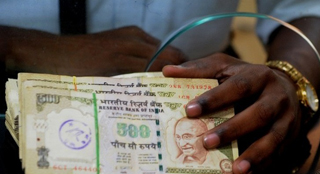
Mumbai, Jun 11: India's rupee slid to a record low against the dollar yesterday as dealers moved into the US currency following robust US jobs data and growing concern about the South Asian nation's struggling economy.
The partially convertible Indian currency ended the day at a new low of 58.15 to the dollar yesterday afternoon, sweeping past its previous low of 57.32 rupees hit on June 28.
"This is a freefall," Abhishek Goenka, chief executive of consultancy firm India Forex Advisors, told AFP.
The rupee's fall is the latest blow to the stuttering growth story of Asia's third largest economy, which has been beset by sharply slower growth, worsening public finances and political turmoil.
A scramble by oil and other importers to buy dollars to pay for imports in the US currency also weakened the rupee, which depreciated seven percent against the dollar in May alone.
Analysts say that while other emerging market currencies have been affected by the dollar's increasing strength, the rupee is particularly hard hit due to the country's troubled public finances and string of corruption scandals.
The widening of India's current account deficit — the broadest trade measure — to almost five percent of gross domestic product in the last financial year has also weighed on the rupee.
Foreign exchange traders reported no signs the Reserve Bank of India (RBI) was intervening in the currency market to support the beleaguered rupee.
"Large-scale intervention from the RBI to buck the trend is unlikely. They cannot stop the tide immediately," said Siddhartha Sanyal, chief India economist with Barclays Capital.
Analysts say the central bank cannot intervene heavily to buttress the currency as it must retain enough foreign reserves for imports. Right now, it only has sufficient reserves for seven months of imports — the lowest cover in 13 years.
The RBI has a policy of not commenting on movements in the foreign exchange market and of intervening only to curb volatility.
New Delhi attempted to ease corporate concerns, saying it will take measures to curb the widening current account deficit as imports outpace exports.
India's chief economic adviser at the Finance Ministry, Raghuram Rajan, said in televised remarks that "medium-term" steps will be taken to ease rupee volatility.
The weaker currency makes imports costlier, especially of foreign oil on which India heavily relies, and will fuel already high consumer inflation.
"The dollar strengthening is hurting the rupee," said Naveen Mathur, commodities and currencies associate director with Angel Broking, who added the local currency was showing "continuous weakness".
With the US economy improving, there is mounting speculation that the US Federal Reserve could "reverse" its monetary stimulus program sooner than expected, Mathur said, prompting the exit of funds from emerging economies in search of better US returns.
Analysts believe the rupee will fall further, with Goenka forecasting that the currency will reach a 59-60 level against the greenback by the end of 2013.
They say the currency's slide puts a question mark over whether the central bank will cut interest rates further at its June 17 meeting, since lower rates usually translate into a weaker exchange rate.
There have been loud calls from business for an interest rate cut to spur the economy, which has been growing at five percent — its weakest pace in a decade. The RBI has already cut rates three times in 2013 to boost growth.
Shares closed virtually flat at 19,441.07 points amid worries that the bank would keep interest rates on hold.








Comments
Add new comment